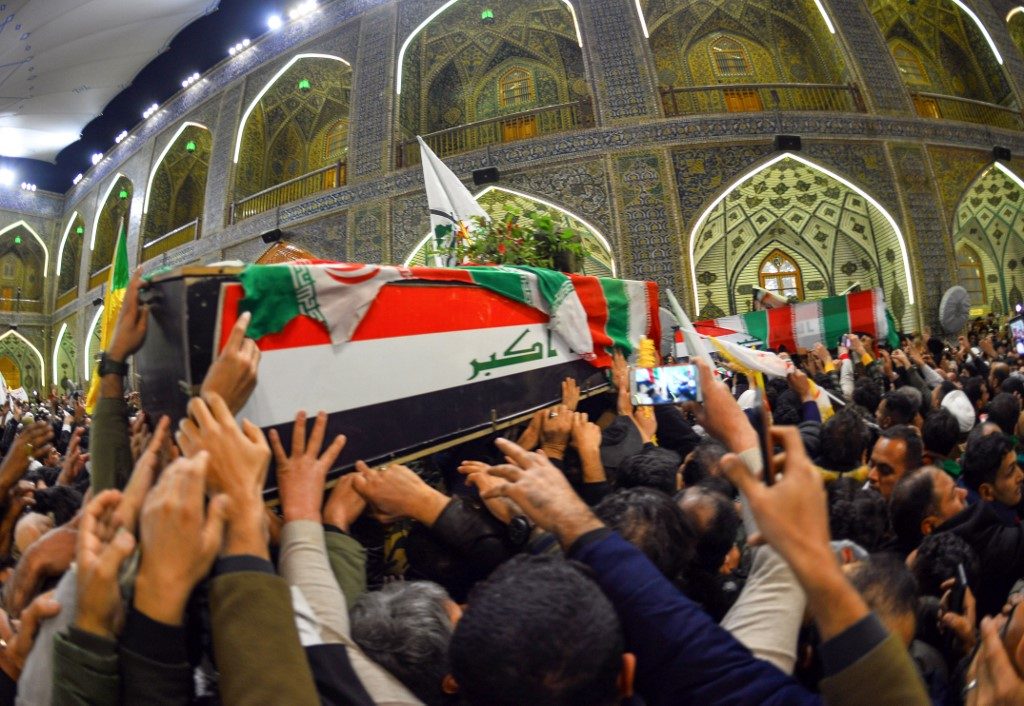SUMMARY
This is AI generated summarization, which may have errors. For context, always refer to the full article.

BAGHDAD, Iraq – Tens of thousands of Iraqis, many chanting “Death to America,” Saturday, January 4, mourned a top Iranian commander and others killed in a United States drone attack that sparked fears of a regional proxy war between Washington and Tehran.
The killing of Iran’s Major General Qasem Soleimani on Friday, January 3, was the most dramatic escalation yet in spiralling tensions between Iran and the US, which pledged to send thousands more troops to the region. (READ: Trump says US targeting 52 sites in Iran, as tension mounts)
Iraqi political leaders and clerics attended the mass ceremony to honour 62-year-old Soleimani and the other 9 victim of the pre-dawn attack on Baghdad international airport. (READ: General Qasem Soleimani: Iran’s regional point man)
US President Donald Trump said he had decided to “terminate” Iran’s military mastermind to prevent an “imminent” attack on US diplomats and troops.
“We took action last night to stop a war,” he insisted. “We did not take action to start a war.”
But a furious Iran has vowed revenge for the killing of Soleimani, the chief architect of its military operations across the Middle East.
“The response for a military action is a military action,” Iranian ambassador to the United Nations Majid Takht Ravanchi told CNN, calling the strike an “act of war.”
“By whom, by when, where? That is for the future to witness.”
In the hours after the strike, the US reached out to Iran, with which it has had no direct diplomatic ties for decades.
Switzerland, whose embassy in Tehran represents US interests, confirmed Saturday its charge d’affaires had on Friday been “informed of Iran’s position and in turn delivered the message of the United States.”
Iran’s Revolutionary Guards said Washington had used “diplomatic measures” to urge Tehran to respond “in proportion” to the strike – a message Iran’s foreign minister Mohammad Javad Zarif slammed as “foolish.”
Zarif also spoke with his Chinese counterpart Wang Yi, who argued that “the dangerous US military operation violates the basic norms of international relations and will aggravate regional tensions and turbulence,” according to Chinese media.
Mourners demand ‘revenge’
The strike killed a total of 5 Iranian Guards and 5 members of Iraq’s Hashed al-Shaabi paramilitary network, whose members have close ties to Tehran.
Among the dead was the Hashed’s deputy Abu Mahdi al-Muhandis, who was a top adviser and personal friend to Soleimani.
Mass ceremonies started in Baghdad on Saturday for the dead, with Iraq’s caretaker premier Adel Abdel Mahdi and top pro-Iran figures in large crowds accompanying the coffins.
They were first brought to a revered Shiite shrine in northern Baghdad, where thousands of mourners chanted “Death to America!”
Dressed in black, they waved white Hashed flags and massive portraits of Iranian and Iraqi leaders, furiously calling for “revenge.”
The remains were then moved to the shrine city of Karbala and would ultimately end up in Najaf, where the Iraqis will be buried. (READ: Iran top general to be laid to rest on January 7 in hometown)
The Guards’ remains would be flown to Iran, which has declared three days of mourning and religious rituals.
As head of the Guards’ foreign operations arm, the Quds Force, Soleimani was a powerful figure domestically and oversaw Iran’s wide-ranging interventions in regional power struggles. (READ: Killing Soleimani: Trump acted where other U.S. leaders saw big risks)
He had long been considered a lethal foe by Washington, with Trump saying he should have been killed “many years ago”.
Tehran has already named Soleimani’s deputy, Esmail Qaani, to replace him.
His first order of business was made clear Friday when Iran’s supreme leader Ayatollah Ali Khamenei promised “severe revenge” for Soleimani’s death.
NATO suspends Iraq ops
Iraqis worry the US strike could unleash a new wave of destabilization for Iraq, which only two years ago announced it had defeated the Islamic State group.
Abdel Mahdi warned Friday it would “spark a devastating war in Iraq,” while President Barham Saleh pleaded for “voices of reason” to prevail.
On Saturday, the Hashed said a new strike had hit a convoy of their forces north of Baghdad, with Iraqi state media blaming the US.
But US-led coalition spokesman Myles Caggins denied involvement, telling AFP: “There was no American or coalition strike.”
Amid the tensions, the Pentagon said up to 3,500 additional US troops would be dispatched to Iraq’s neighbour Kuwait, to boost some 14,000 reinforcements already deployed to the region last year.
About 5,200 US troops are stationed across Iraq to help fight IS.
They have faced a spate of rocket attacks that the US has blamed on pro-Iran factions and which last month killed an American contractor.
As a result of the tensions, NATO said it was suspending its training activities in Iraq and a US defence official told AFP that American-led coalition forces would “limit” operations.
“Our first priority is protecting coalition personnel,” the official said, adding that the main focus of surveillance had shifted from the Islamic State to watching for incoming rocket attacks.
Iraq’s defence ministry had not been informed of the changes, its spokesman told AFP on Saturday.
US citizens were meanwhile urged to leave Iraq immediately and American staff were evacuated from oil fields in the south.
Iraq’s pro-Iran factions have seized on Soleimani’s death to push parliament, which convenes Sunday, January 5, to revoke the security agreement allowing US forces on Iraqi soil.
While praying over Muhandis’s remains in Baghdad, top Hashed official Hadi al-Ameri pledged to avenge him by ousting US troops.
“Be reassured that the price of your pure blood will be the departure of American troops from Iraq, forever,” he said. – Rappler.com
Add a comment
How does this make you feel?
There are no comments yet. Add your comment to start the conversation.